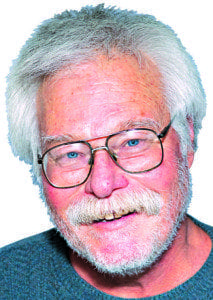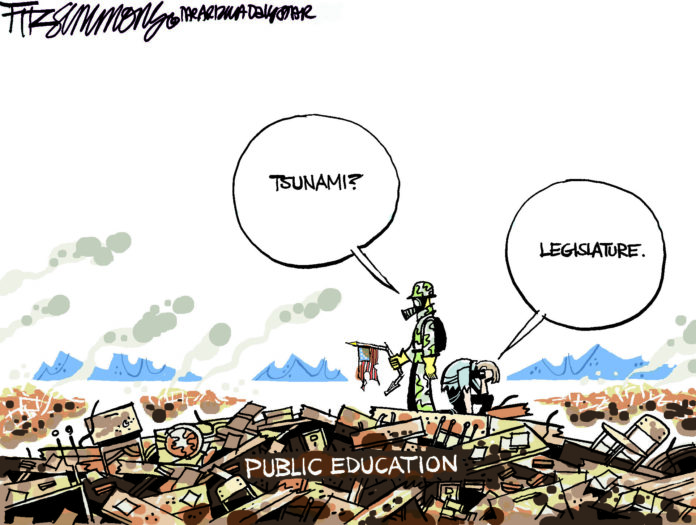Editor’s Note: This is the first of two essays by veteran Oklahoma educators analyzing State Question 779, the proposed one percent sales tax increase for public education that will appear on the Nov. 8 statewide ballot. The second essay will be posted tomorrow. Both first appeared in the September edition of The Oklahoma Observer.
BY JOHN THOMPSON
 We definitely must vote Yes! on SQ 779. I wish we could cast our ballots with the certainty that we are making the right choice for the right reason. Voters must not be ambivalent, however. A No vote would be catastrophic. Oklahoma needs a huge turnout to vote for school funding, and get on track towards providing an educational and economic future for all of our kids.
We definitely must vote Yes! on SQ 779. I wish we could cast our ballots with the certainty that we are making the right choice for the right reason. Voters must not be ambivalent, however. A No vote would be catastrophic. Oklahoma needs a huge turnout to vote for school funding, and get on track towards providing an educational and economic future for all of our kids.
Rarely do I comment on school finances. I focus on education policy, especially in regard to high-poverty Oklahoma City schools. Neither do I like to think of education funding in isolation. To build a just and promising future, teachers and school systems must join as team players with state and local social service providers and nonprofits in order to tackle complex and interconnected challenges. If this were merely a question of how to fund an increase in teacher salaries, I don’t know where I would come down in terms of the arguments by good Democrats and policy experts who question whether the sales tax is the proper tool.
Our teachers need a raise. They’ve gone a decade without one. Oklahoma invests 22% less than the rest of the region in per student funding, and we continue to cut education spending by as much or more as any state in the country. We face an exodus of teaching talent to neighboring states where teachers might be paid $10,000 more while living just a few miles across the border. Teachers need the $5,000 a year raise that SQ 779 would fund. But that is not the reason for taking the unusual step of raising sales taxes.
SQ 779 is not about teachers or other adults. It is about our kids. SQ 779 is a belated effort to rescue our poorest children’s educations. In some of Oklahoma’s most challenged districts, our schools could literally collapse. Rather than question the harm that a penny tax increase could inflict on cities and our poorest voters, we should ask about the price tag for rebuilding our most challenged schools in those cities. In fact, the defeat of SQ 779 could be a No vote on whether we care enough to salvage our most disadvantaged schools.
I know this will sound like hyperbole to some. Seventeen years ago, I wondered if business leaders were exaggerating when they briefed members of the MAPS for Kids bipartisan coalition. I was discreetly told that the MAPS effort to raise a temporary sales tax and property taxes was likely the last chance for the Oklahoma City Public School System. The OKCPS had suffered through too many years without passing bond issues and the bill for the chronic underfunding of schools was about to come due. If the voters did not support the tax increase, the next step would be to try to manage an orderly breakup of the district. Under such a situation, it would be unlikely that anything resembling adequate education options would be provided for our poorest children.
I saw real progress at John Marshall and in other OKCPS schools after the MAPS tax was passed, but then came No Child Left Behind. Teachers and students have since been afflicted with 15 years of test, sort, reward, and punish malpractice. Bubble-in accountability has stolen so much of the joy of teaching and learning. The energies of adults and kids alike have been squandered on soul-killing bubble-in malpractice.
During the last few years, in Oklahoma and across the nation, educators have joined a grassroots uprising against test and punish, as well as the increased segregation that accompanied school choice. Finally, we are pushing back against the way that the extreme proliferation of charters has undermined underfunded, traditional public schools. Even so, adults and students are exhausted by this ordeal.
I left the fulltime public school classroom during the Great Recession, at the time when my school dropped to the last in the state. I haven’t done a very good job of being retired, however, and I’ve stayed in touch with inner city schools by teaching part-time and volunteering in high-challenge classrooms. Even with the oil bust, the overall economic gains of recent years since 2010 should have made the problems that children bring to class become more manageable. And I’ve seen some incremental gains even as I wonder why the schools I visit still haven’t been able to gain more traction.
As unusual, my colleagues who remain in the classroom still emphasize the positive. But I can’t forget the pattern that repeated itself throughout my career.
Whenever our top teachers went to a district meeting, a conference, or even a basketball game where we ran into former students who transferred to less challenged schools, we’d hear the same sales pitch. We’d repeatedly turn down offers to transfer to more respected schools where it would be easier teach. Year after year, we would turn down the offers. Each spring, though, a great teacher would admit to nightly headaches or crying him or herself to sleep, and the transfer opportunities would seem more irresistible.
As NCLB undermined the progress funded by MAPS for Kids, it was especially hard to not be worn down by a sense of betrayal. At the end of one year, 14 of our best teachers and principals broke down and accepted their prestigious offers, and the school never recovered from the loss.
I understand that I have not undergone the full set of challenges that my former colleagues faced during the last six years of austerity, while they’ve also been forced to implement soul-killing federal and state mandates.
In the highest-challenge schools, I also suspect that teachers’ fatigue is not the most worrisome concern. From what I hear from students and former students, they often are the ones who face the worse burnout.
An entire generation has endured an education career dominated by teach-to-the-test. Not only have the kids been encouraged to practice bad learning habits, but also many have been disenchanted about school. Young people need adults to take charge, protect students from the types of malpractice that has been thrust on teachers and learners alike.
I’d love to believe that inner city teachers who have stuck it out could shake off a defeat at the polls, ignore out-of-state salaries, and turn down offers to transfer to easier classes, but I have my doubts.
Middle class and affluent schools will survive the crisis. There is no law carved in heavenly stones, however, guaranteeing that public schools for our most vulnerable children must survive. The legislative cavalry isn’t about to charge over the hill, providing the resources that our overburdened teachers and students need.
If the voters don’t come to the rescue in terms of providing financial relief, at least to the most under-resourced schools, I fear for the worst.
Dr. John Thompson, an education writer whose essays appear regularly in The Oklahoma Observer, has a doctorate from Rutgers University and is the author of Closing the Frontier: Radical Responses in Oklahoma Politics. His latest book, A Teacher’s Tale, is available through Tate Publishing.







